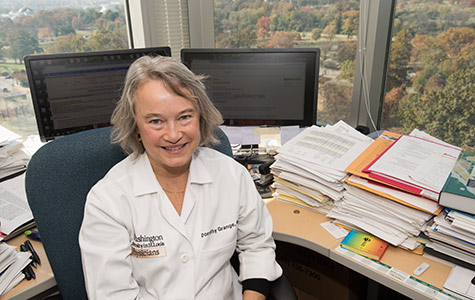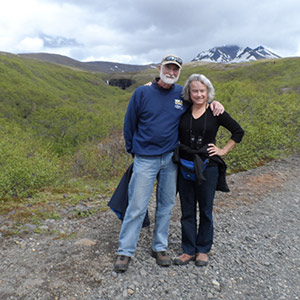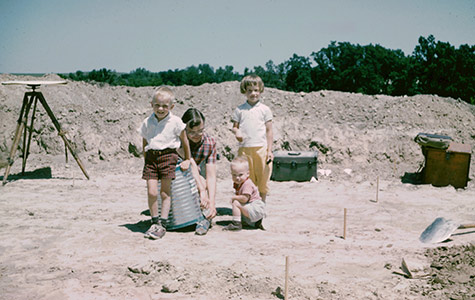
Every summer as a child, Dorothy Katherine Grange looked forward to digging for skeletons.
Sometimes she found other things in the dirt, such as weapons or tools. Although those discoveries thrilled her, skeletons provided the most excitement because the bones resembled puzzle pieces — and her father, an archeologist and anthropologist, showed Grange how to put the puzzle back together.
One summer when Grange was 10 years old, her father, mother and two younger brothers uncovered heaps of fish and bird bones in a French and British fort in Newfoundland. Her father called the skeletons valuable trash because they shed light on the long-ago diets of the military groups that had inhabited the fort.
Two summers later, at age 12, Grange helped to unearth a bone bonanza in South Carolina: Human remains, snug in the soil of an ancient Cherokee Indian burial mound that was soon to be submerged by the development of a reservoir.
“I loved going on digs because every discovery offered clues about another way of life,” Grange said. “Every dig was special. Never the same thing twice.”
Like those archeological digs, every day is a professional adventure for Grange, MD, a professor of pediatrics and director of the Division of Genetics and Genomic Medicine in the Department of Pediatrics at Washington University School of Medicine in St. Louis.
Her activities entail solving medical mysteries and pursuing diagnoses of rare diseases. One day, for instance, Grange may treat a baby boy born with a rare genetic disorder that prevents him from sweating, a potentially dangerous condition. Another day, as medical director of the Down Syndrome Center at St. Louis Children’s Hospital, she may be raising awareness about the common chromosomal condition. Days later, she may be conducting clinical research on children with excessive facial hair, heart defects or skeletal abnormalities.
“Each day is different,” Grange said. “It’s never the same condition day in and day out. This sort of challenge and pace motivates me and keeps me intrigued.”
This is especially true when a family has authorized extensive genetic testing and seen several doctors, sometimes in other states or countries, before visiting Grange’s office in a desperate quest to find a diagnosis and treatment plan for a child with unusual or unexplained symptoms.
Searching for answers
About one-third of Grange’s patients lack diagnoses. However, collaborations with research groups worldwide, coupled with the increasing availability of clinical whole exome sequencing – a method of evaluating the coding sequences of all genes in the genome – has helped significantly in determining diagnoses.
But medical mysteries still remain. “Even this advanced testing is only able to provide a diagnosis in 35 to 40 percent of the patients we test,” Grange said. “Sometimes I cannot give families a definitive answer.”

Perseverance is key. “It is important to follow patients and their families, sometimes over many years, in pursuit of a diagnosis since new genes are being linked to human diseases at a rapid rate,” Grange said.
Two decades ago, for example, Grange published a research paper on a St. Louis family with multiple children affected by a rare condition characterized by a combination of widespread narrowing of arteries called fibromuscular dysplasia, cardiac defects, bone problems and abnormalities of the hands and feet.
“I have kept in contact with the family over the years trying to figure out the cause of the condition,” she said. “Three similar cases eventually were reported in people in New Jersey, Italy and Austria. I sent samples from the St. Louis family to different research labs and, finally, this year, collaborators at the University of Texas identified the responsible gene.”
Research about the gene behind the condition now known as “Grange syndrome” was presented by Texas researchers at the American Society of Human Genetics in October. “It’s exciting to finally have an answer,” she said.
Although the condition is very rare, defects in this gene may turn out to be related to the cause of much more common cases of isolated fibromuscular dysplasia. Study of rare diseases is important, Grange explained, because it often leads to knowledge that is relevant to the understanding and treatment of common conditions.
Grange’s problem-solving skills are lauded within the medical community, where she has received numerous accolades including, earlier this year, the School of Medicine’s peer-nominated Distinguished Clinician Award.
“Kathy Grange is an outstanding pediatric geneticist,” said Alan L. Schwartz, PhD, MD, the Harriet B. Spoehrer Professor and head of the Department of Pediatrics. “She is a consummate clinician with deep understanding and decades of experience in dysmorphology, clinical genetics and biochemical genetics.
“She is highly regarded as a superior diagnostician across disciplines,” he continued. “She combines these outstanding skills with a love of teaching and the inquiry to bring evolving technologies to genetic diagnosis and treatment.”
Noted investigator
Indeed, Grange’s name is cited in dozens of research papers exploring the world’s oddest and most obscure genetic diseases in children. One such condition is called X-linked hypohidrotic ectodermal dysplasia, or XLHED, found primarily in boys. It can cause respiratory infections, dental deformities, extremely thin hair and an inability to sweat and, as a result, regulate body temperatures.
Currently, no treatment exists. However, Washington University is one of six medical centers across the globe participating in a clinical trial aimed at developing a synthetic protein to replace the one missing in children with XLHED. Grange is at the forefront of the investigation. Thus far, she’s treated two of the 11 babies in the trial in hopes of correcting the genetic mutation by providing the missing protein.
Another rare condition that intrigues Grange is Cantu syndrome, distinguished by excessive hair growth, an enlarged head and broad facial features. Cardiovascular abnormalities are also common. “I became interested in this condition after diagnosing several patients who live in the St. Louis area,” Grange said. “Because of the specific genetic defect, there is good reason to believe that treatment will be possible, either using already approved drugs or a drug specifically developed for Cantu syndrome.”
Grange’s eventual foray into mysterious pediatric diseases began with a double major in biology and chemistry at Mount Holyoke College in South Hadley, Mass., where she earned a bachelor’s degree in 1976.
She gravitated toward methodical problem-solving inherent to the sciences, compelling her to obtain a medical degree in 1981 from the University of Florida College of Medicine in Gainesville, Fla. She then studied pathology the following year at the school.
Inspired by children and intrigued by disease research, Grange continued her medical studies at the University of Wisconsin, with residencies in pediatrics and pathology in 1985 and 1986, respectively.
Grange then enrolled in a three-year fellowship in medical genetics at the National Institutes of Health (NIH) in Bethesda, Md., before landing in St. Louis in 1989 — first as a pediatric geneticist at Saint Louis University School of Medicine and then, in 2001, at Washington University.
While conducting her disease-related detective work, Grange raised three sons, now adults, with her husband, Paul Olivo, MD, PhD, an adjunct faculty member in molecular microbiology at the School of Medicine and a noted entrepreneur in the St. Louis biotech sector.
Not surprisingly, Grange’s hobbies reflect her career and childhood interest: Solving mysteries, whether it’s identifying a wildflower based on color and petal shapes or — armed with binoculars and guide books — classifying bird species in native habitats. She has explored volcanic hot springs in Iceland and art and architecture in Europe and Turkey.
Her father believes summertime digs prepared his daughter for a successful medical career.
“Archaeology often requires painstaking work under difficult circumstances,” said Roger Grange, a professor emeritus in anthropology at the University of South Florida in Tampa and a volunteer archaeologist at a nearby history museum. “It necessitates learning how to observe and read the dirt for clues most people would not recognize. Her research now involves similar rigorous observation.”
Grange agreed: “My father’s passion for archeology and his ability to use historic artifacts and information found through excavation to identify patterns instilled in me a desire to solve medical mysteries.”
